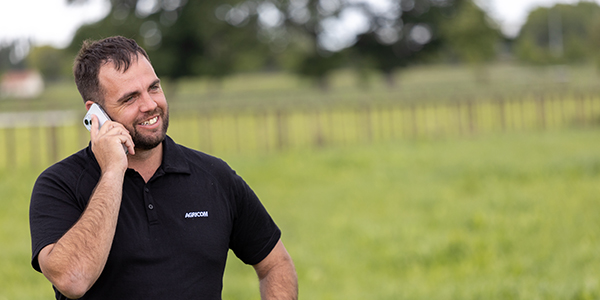Brace
ALL SEASON PRODUCTION.
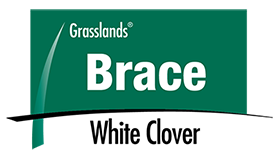
- Leaf Size Large
- Pasture Life Perennial
- Grazing Seasons Autumn, Spring, Summer, Winter
- New generation of genetics for large-leaved white clover
- Very high spring and summer production
- Improved autumn and winter activity
- Ideal for dairy, beef and lamb finishing and silage pastures
Brace was finally selected after extensive dairy evaluation in the Waikato with proven persistence, high yield and adaptability to current environmental conditions in the presence of pests and current fertiliser practices. Brace has more consistently large leaves, making it a very visual white clover. It has production improvements in all seasons particularly noticeable in autumn and winter.
Learn more about how this resilient clover will support your farm through autumn and early winter on The Al & Juddy Show podcast, or check out more Seed Dating episodes here.
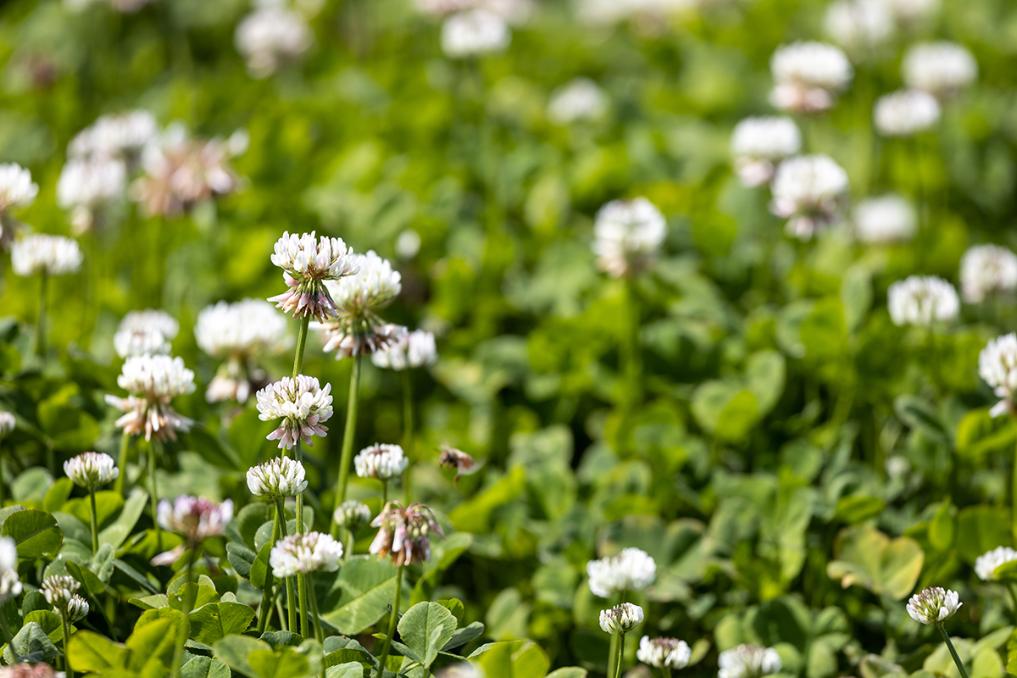
How it works
Brace is a large-leaved white clover and is an exciting addition to New Zealand’s farming industry. The history of DSIR/AgResearch Grasslands white clover breeding programmes has added high value to all farm systems across New Zealand and the world. AgResearch Grasslands have successfully crossed and evaluated white clover germplasm from around the world for decades, and over the last 20 plus years have been acutely aware of the increased activity within the dairy industry, the intensity of production, the emergence of clover root weevil and the continued impact of climate variation on unirrigated dairy areas. It was from this backdrop that white clover parents, with broad genetic backgrounds including ecotypes, were combined to produce the new variety Brace.
Where Brace fits
Brace has performed to the highest levels in Northland, Manawatu and Canterbury, especially in high grass production systems such as dairy, dairy support, hybrid and Italian ryegrass pastures.
Performance Data
Brace, the successor to Mainstay large-leaved white clover, produces a consistently larger leaf size, enhancing its visual presence within pastures. It offers superior seasonal drymatter production, with the most notable improvements in autumn and winter. These gains in cool season growth position Brace to compete effectively with winter active ryegrasses and underpin strong performance through the key spring and summer production periods.
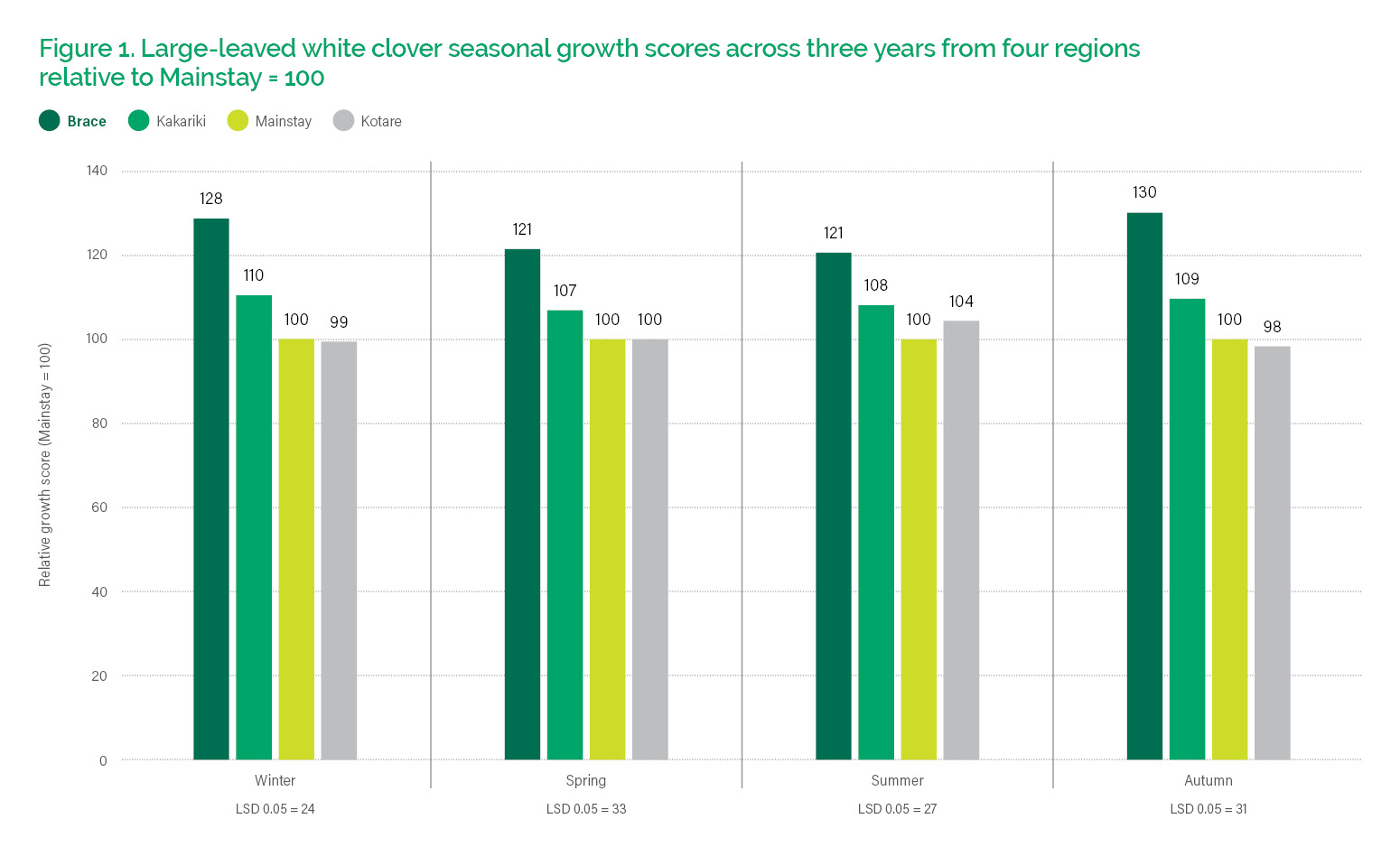
Evaluating the performance of modern white clover genetics in a ryegrass + white clover mixed sward
In spring 2021, Agricom established a replicated plot trial to evaluate different white clover cultivars which were all sown with Three60 AR37 perennial ryegrass. The grass cultivar and sowing rate were kept consistent across the swards, enabling a comparison of the white clover cultivars based on both the quantity and quality of pasture produced.
The trial also included control plots for both grass treatments (without clover) and an additional treatment of Three60 AR37 with Relish red clover, allowing for a comparison of red clover’s performance in this system relative to white clover.
Measuring the yield contribution of modern white clover genetics in a mixed pasture under nitrogen limited conditions
Fertiliser was applied to this trial at a rate of 190 kg N/ha/year, using a ‘complex’ product to ensure phosphorus (P), potassium (K), and sulfur (S) are non-limiting. The fertiliser is distributed across four applications of 46 kg N/ha throughout the calendar year.
Yield is measured 10 times per year using a forage harvester, which cuts the forage to a height of 4–6 cm. Fresh weight is recorded for each plot, and samples are taken for drying to calculate the drymatter percentage. These measurements are used to determine the drymatter production for each treatment in the trial.
Figure 2 presents the interim cumulative yield, covering the period from sowing in spring 2021 to spring 2024.
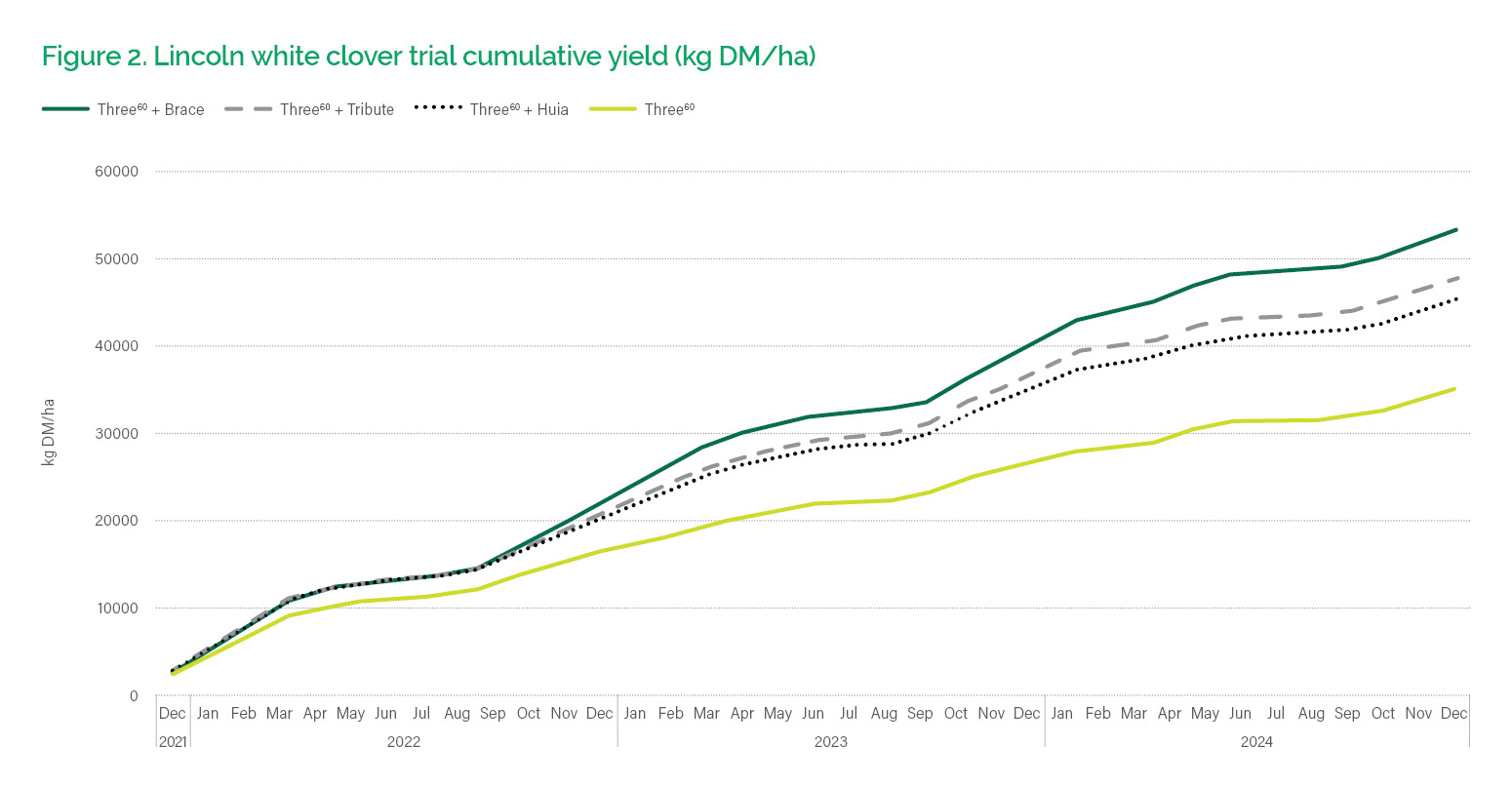
3 tonnes/ha annual production increase using modern white clover genetics relative to commodity clovers
Figure 3 presents 12 months of yield data in the trial. With the same amount of nitrogen applied, Three60 + Brace produced an additional 3575 kg DM/ha compared to Three60 + Huia, highlighting the significant annual production gains achievable with modern white clover genetics.
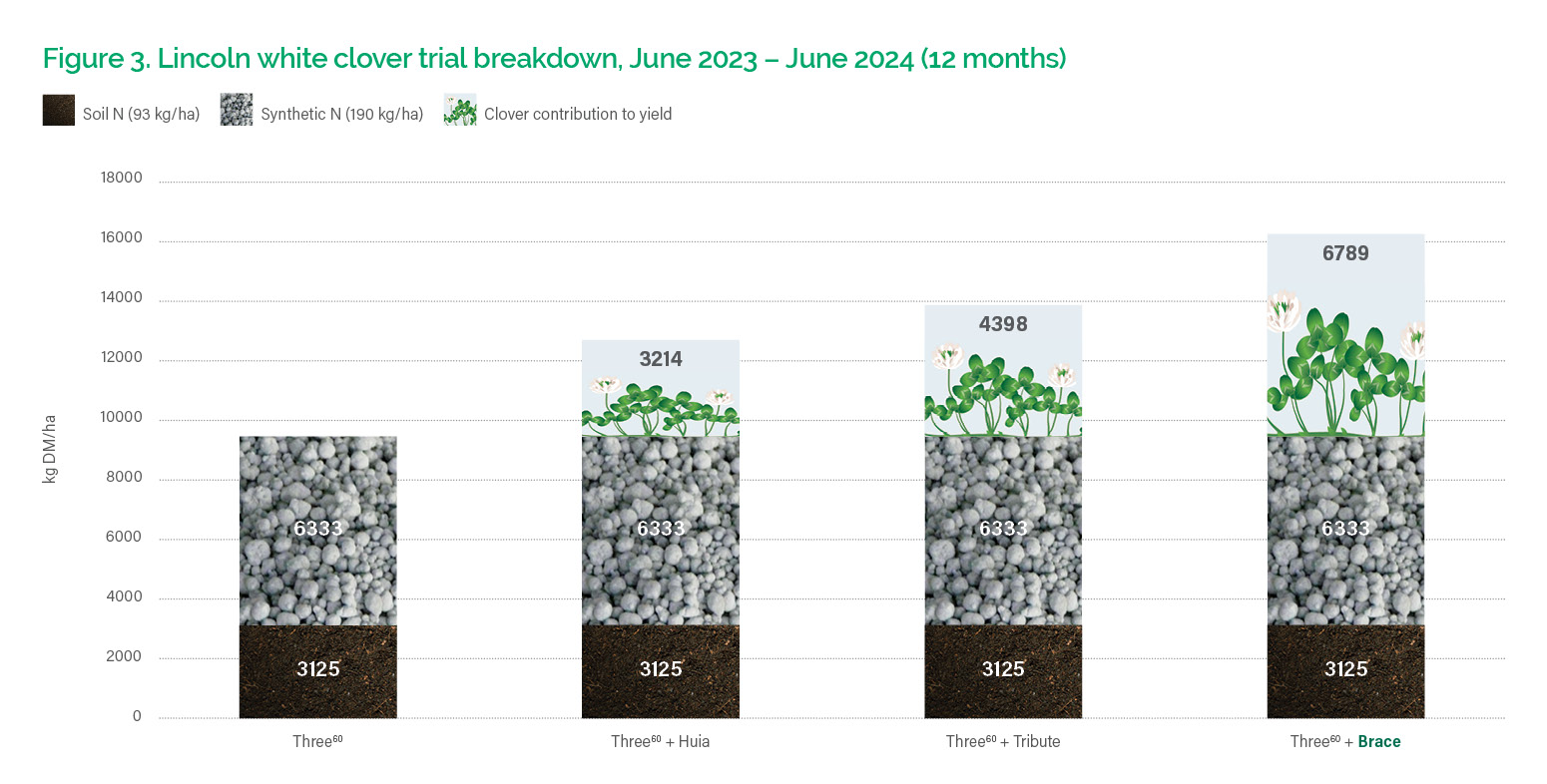
Providing farm system solutions to maintain production under synthetic nitrogen limitations
In perennial ryegrass pastures featuring new generation, high density grasses like Three60, modern white clover cultivars have demonstrated the ability to produce over 15 tonnes of drymatter per hectare per year under a cut and carry system, with just 190 kg N/ha/year applied. Cultivars such as Attribute and Brace offer farmers an effective tool to maintain or even improve pasture productivity while complying with regulations on synthetic nitrogen application.
To view full trial results click here.
Suggested Mixes
Short term pasture
Mohaka has very strong spring production which makes it ideal for early spring pastures or part of a 3-4 year rotation in a runoff situation where silage production is a high priority.
| Rate (kg/ha) | |
|---|---|
| Mohaka AR37 or AR1* tetraploid hybrid ryegrass | 22-25 |
| Brace white clover | 3 |
| Attribute white clover | 2 |
| TOTAL |
27-30 |
Anvil is a particularly strong summer and autumn producer, making it an outstanding option for all summer production systems.
| Rate (kg/ha) | |
|---|---|
| Anvil AR37 tetraploid hybrid ryegrass | 22 |
| Brace white clover | 3 |
| Relish red clover | 5 |
| TOTAL | 30 |
*It is not advisable to mix AR37 and AR1 varieties. AR1 is not recommended for areas where black beetle, porina or root aphid are common problem pests. Grass seed should be Superstrike® treated where Argentine stem weevil, black beetle or grass grub are a risk to seedlings. For more information on AR37 endophyte, visit ar37endophyte.com. AR37 is only recommended for sheep, beef, and dairy.
Dairy pasture mix
Three60 is perfect for dairy production due to its outstanding summer, autumn and winter growth, quality and persistence.
| Rate (kg/ha) | |
|---|---|
| Three60 AR37 or AR1* perennial ryegrass | 18 |
| Brace white clover | 3 |
| Attribute white clover | 2 |
| TOTAL | 25 |
Tetraploid diploid mixed pasture
The ultimate summer pasture combo for improved resilience and performance.
| Rate (kg/ha) | |
|---|---|
| Align AR37 or AR1* tetraploid perennial ryegrass | 12 |
| Three60 AR37 or AR1* perennial ryegrass | 10 |
| Brace white clover | 3 |
| Attribute white clover | 2 |
| TOTAL | 27 |
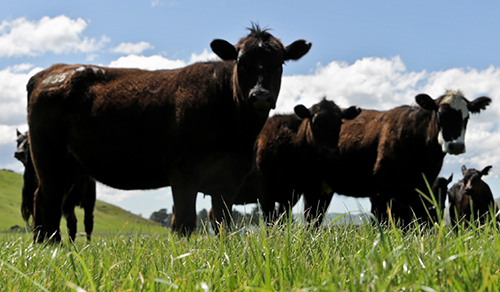
Read a case study
Agricom Case Studies